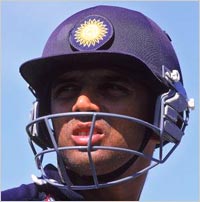Send youngsters abroad more often: Dravid
Fakir Hassen
Sending younger Indian cricket squad members abroad more often would help them prepare better for international matches, says Rahul Dravid.
Speaking to the daily newspaper The Star, Dravid also called for youngsters from
smaller villages and cities in India to be given more opportunities.
 "We need to send out youngsters on more A team and under-19 tours abroad.
That would prepare our future cricketers well for international matches. The
exposure would be tremendous for them," Dravid said. "That would give the up
and coming youngsters the opportunity of playing in different countries
rather than playing continuously on slow turners and then being thrown into
the international arena."
"We need to send out youngsters on more A team and under-19 tours abroad.
That would prepare our future cricketers well for international matches. The
exposure would be tremendous for them," Dravid said. "That would give the up
and coming youngsters the opportunity of playing in different countries
rather than playing continuously on slow turners and then being thrown into
the international arena."
That was the reason Indians were considered poor travellers although they excelled at home, Dravid said.
"When we encounter pitches with pace and bounce we tend to get caught out. That's not to say we are poor players. It has to do with conditions. It is impossible to prepare pitches with bounce and pace back home to compare with the conditions which we experience here and in Australia."
Dravid added that Indian subcontinent cricket authorities had been trying
their best to prepare pitches with pace and bounce but had been
unsuccessful.
"The soil and the weather conditions come into play. It's very hard in some
places in India with the kind of heat and humidity plus the water shortages
that officials have to put up with. The grass just does not grow the way it
does here, so it's well and good to say 'let's prepare bouncy wickets', but
it is not easy to do," he said.
Dravid's theory about international exposure was a valid one, said cricket
writer Iqbal Khan. "Only the likes of Dravid, Sourav Ganguly and master
batsman Sachin Tendulkar have been able to adapt quickly to conditions here
in South Africa when they tour other countries," he said.
"All three have had experience of playing in the English County Championship
which affords players the opportunity to ply their trade in different
conditions regularly," he added.
Asked where the Indian selectors had found some of the younger members of
the national side that is here, Dravid said the game of cricket was no
longer confined to the big cities of India.
"There is a lot of talent in India and the youngsters are passionate about
the game. India is a huge country and logistically and administratively it's
not easy to tap the talent in the various little towns and villages. Today
the focus of Indian cricket is shifting from the big cities to the smaller
towns and villages and a lot of the new young cricketers, whom we would not
have heard of, are coming out of these smaller towns," he said.
"It would not have happened in the past as the game was concentrated in
Mumbai, New Delhi, Bangalore, Madras (Chennai) etc.," Dravid told the Star.
"It's not possible to have the infrastructure in every part of the country,
but I believe the Indian cricket board is trying its best to grow the game
throughout the country," he concluded.
--Indo-Asian News Service
Mail Cricket Editor